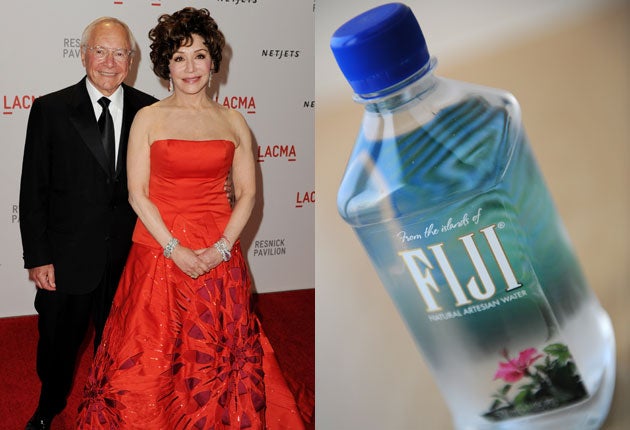Fiji Water quits South Pacific over tax rise

Pop stars, celebrities, and even the US President may soon have to find a new way to quench their thirst after the fashionable mineral water company Fiji Water announced that it was to cease operating in the South Pacific country that bears its name, amid a growing dispute with the nation's ruling military junta.
The firm said it had decided to close its only factory, in the Yaqara Valley on the main island of Viti Levu, with the loss of 400 jobs, after the government announced a new tax of 15 cents [10 pence] per litre on companies extracting more than 3.5 million litres of water a month. Previously, the tax rate was just one third of one cent.
"This new tax is untenable and as a consequence, Fiji Water is left with no choice but to close our facility," the company said, arguing that it "sends a clear and unmistakable message to businesses operating in Fiji or looking to invest there: the country is increasingly unstable and a very risky place in which to invest."
The move means orders from suppliers have been put on hold by Fiji Water, which produces the most popular brand of imported water in the US. It sells its highly-recognisable bottles in 40 countries, and claims to be responsible for 20 per cent of Fiji's exports and three per cent of its GDP.
The firm has been clashing with Fiji's military regime, which took power in a 2006 coup. Earlier this month, its executive David Roth was deported from the country in a dispute that saw him accused by the junta's leader, Frank Bainimarama, of acting "in a manner prejudicial to good governance and public order". If Fiji Water's decision to pull out of the nation stands, it's difficult to see how the product can survive: the trendy brand revolves around the allegedly unique and life-enhancing properties of the underground spring from which it is sourced, which is said to be particularly pure.
That marketing pitch has been enough to turn Fiji Water into a favourite of the celebrity classes, drunk by everyone from Scarlett Johansson and Justin Timberlake to Nicole Kidman and the Obamas.
Fiji Water has also aggressively styled itself as an eco-friendly product, claiming that it pays to offset all the carbon emissions which come from transporting square plastic bottles from one of the world's most remote locations to the refrigerators of major cities. Al Gore swigs it while delivering speeches about global warming, while the firm's owners are the well-connected LA-based philanthropists Lynda and Stewart Resnick, who have given millions of dollars to progressive causes and Democratic Party politicians.
Not everyone is convinced by their green-washing, however. Some critics have scoffed at the notion that bottled mineral water can ever be environmentally responsible, and point out that many residents of Fiji have no access to clean drinking water, and suffer from diseases such as typhoid.
Others have raised eyebrows at the firm's corporate structure: court records show that, in 2008, it was owned by an entity in the tax haven of Luxembourg, though some assets have recently been transferred to Switzerland. Despite its current hostility to Fiji's taxman, the firm has enjoyed tax-exempt status on corporate income since it was founded in 1995. Fiji is meanwhile suffering from economic sanctions against its government from the EU and other trading partners. Its regime has fallen out with many overseas investors, including Rupert Murdoch's News Corp, which in September sold its controlling stake in Fiji's main newspaper in protest at ownership limits on foreign media companies.
Yesterday, Mr Bainimarama launched his own PR offensive, claiming that "as usual Fiji Water has adopted tactics that demonstrate that Fiji Water does not care about Fiji or Fijians".
Join our commenting forum
Join thought-provoking conversations, follow other Independent readers and see their replies
Comments
Bookmark popover
Removed from bookmarks